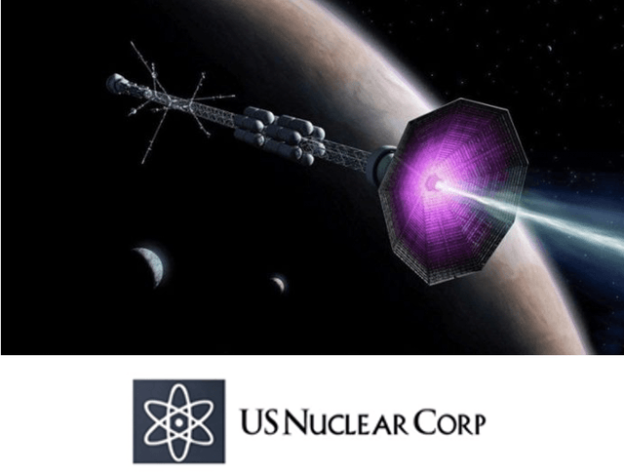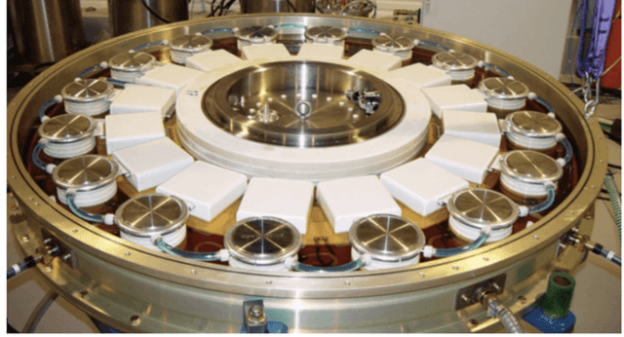US NUCLEAR
FUTURISTIC STAR TREK ROCKET ENGINES COULD BE HERE SOONER THAN YOU
THINK
January 25, 2021 --
InvestorsHub NewsWire -- via
BioResearchAlert --
-
The US announced
efforts to develop a new generation of more powerful and much
faster rocket engines to replace conventional chemical powered
rockets that are too slow for deep space exploration
-
December 16, 2020,
the White House issued Space Policy Directive-6 (SPD-6), which
outlined a national strategy for using space nuclear power and
propulsion (SNPP) systems in a safe and effective
manner
-
Nuclear fusion
propulsion should far outperform fission-based propulsion, because
fusion reactions release up to four times as much energy, says NASA
chief engineer Jeff Sheehy
-
A common belief is that fusion powered rockets
that can travel at close to the speed of light are still at least
30 years away, but US Nuclear partners have proven that they may be
much closer than realized
-
US Nuclear partners
MIFTI and MIFTEC developed and proved their revolutionary fusion
energy technology that they believe will be able to propel a rocket
ship at velocities approaching the speed of light
-
November 2019, by
invitation from NASA, Dr. Rahman, President and Chief Scientific
Officer of MIFTI presented MIFTI's fusion powered space
drive
-
NASA subsequently
included Dr. Rahman's (MIFTI's) 36-page technical presentation in
their report titled, "Advanced Interstellar Propulsion
Workshop"
-
MIFTI's Staged
Z-Pinch Fusion Generators enjoy historic progress and achievements
and could become the heart of the standard propulsion system for
deep space travel that could also dramatically change the world
with abundant, low-cost, clean energy
-
US Nuclear is a
microcap penny stock with exclusive manufacturing rights for
MIFTI/MIFTEC first fusion generators and will be the leading expert
to become the prime builder of the powerful light-speed rocket
engines for deep space travel.

On December 16,
2020, the White House issued Space Policy Directive-6 (SPD-6),
which outlines a national strategy for using space nuclear power
and propulsion (SNPP) systems in a safe and effective manner. The
new policy directive confirms the United States' commitment to
using SNPP systems and establishing nuclear power stations on the
moon and beyond, which is good news for US
Nuclear (OTCQB:
UCLE) and partner MIFTI, who designed and is testing the
thermonuclear fusion power generators.
Scott Pace of the
National Space Council, commented "Space nuclear power
and propulsion is a fundamentally enabling technology for American
deep-space missions to Mars and beyond. The United States intends
to remain the leader among spacefaring nations, applying nuclear
power technology safely, securely, and sustainably in space." The
key factor for enabling space travel are the new nuclear powered
propulsion systems, as traditional chemical powered rocket fuels
are hopelessly weak. DARPA, NASA, and the US Space Force have
recently gotten serious and deployed the nuclear option. Why?
Nuclear fuels and nuclear power systems, such as the recently
proven MIFTI Z-pinch fusion reactor, can deliver 10,000,000 times
the work (or energy) per payload pound than the chemical rocket
fuels now used by Musk's Space-X, Bezos's Blue Origin, Branson's
Virgin Atlantic, as do Lockheed and Boeing.
Until MIFTI's
recent successful experiments at the University of Nevada, Reno
National Terawatt Facility the development of thermonuclear fusion
has been elusive and has only been successfully developed in the
hydrogen bomb. It is of interest to note that Dr. Hafiz Rahman,
MIFTI President and Chief Scientific Officer, worked with Edward
Teller, the father of the hydrogen bomb and previously co-chaired a
NASA committee to oversee the development of advanced technologies
for high-speed rocket propulsion systems.
MIFTI Staged
Z-Pinch Fusion Generator


The Long and
Hard Road to Fusion Energy
Billions of dollars
have been invested in many different companies attempting to
develop fusion power but, until now, results have been very
disappointing as reported by Daniel Jassby, retired Plasma Physics
leading expert in neutrons in his article, Voodoo
Fusion Energy. Jassby says, "Numerous
fusion "startups" promise a practical fusion reactor delivering net
electric power in 5 to 10 years, but almost all have apparently
never produced a single D-D fusion reaction. The currently most
notorious (in alphabetical order) are General Fusion, Helion
Energy, Lockheed-Martin Compact Fusion and Tri-Alpha Energy, all of
which have made that promise for the last 5 to 15 years."
The Long Wait
for Fusion Energy Is Finally Over
The world's leading
Fusion Energy Journal, "Physics of Plasmas" recently published a
report that was peer reviewed, investigated, and confirmed. The
results of massive neutron creation in a stable plasma implosion
were unceremoniously reported in a highly technical journal. A
surprisingly powerful and stable neutron flux of 10 to the 10th
power was repeatedly achieved by MIFTI on a small machine of only 1
Mega Amperes at the University of Nevada, Reno Terawatt Facility.
The title of this report is, "Ar
and Kr on
deuterium gas-puff staged Z-pinch implosions on a 1-MA driver:
Experiment and simulation" as it appears on the May 2019
issue.
When asked what the
biggest milestone achievements have been since they first announced
their breakthrough technology last year, Jerry Simmons, CEO and
co-founder of both MIFTI and MIFTEC said, "In the
second half of last year we did what nobody else has ever been able
to do. Not even the big government projects. We made history by
generating consistently Neutron Flux in excess of 1010+
(10 billion neutrons) from fusion power using an isotope of
hydrogen from seawater instead of radioactive enriched uranium.
This proves beyond any doubt that our machine can make the isotopes
used in nuclear medicine (i.e.
Mo-99,
Tc-99m, cobalt 60, iodine 131, etc.).
Dr. Hafiz Rahman,
President and Chief Scientist and his staff at MIFTI and MIFTEC
tells us, "It is
only a matter now of simply scaling the power or electric current
flow of our machine up so we can achieve the greater Neutron Flux
of1012+.
Our scientific experimental and theoretical predictions show that
the device will work as designed."
Dr. Hafiz Rahman
says, "To give you
an idea of how advanced we are, when we achieve 10 to the 15th, it
will be 10,000,000,000 (ten billion) times more powerful than 10 to
the 5th. That is more than enough power to create all the Neutron
Flux we need to supply low-cost radioisotopes and power for
production of electricity with our compact, low
cost machines."
Mr. Simmons
continued, "The
machine we used at University of Nevada, Reno Terawatt Facility was
a 1 MA (1 Mega Amp) machine which limited the Neutron Flux we could
generate to 10 to the tenth power or 10 billion neutrons per pulse.
Last year, we hired a top nuclear design engineer
and he has
already completed the design for our new 10 MA (10 Mega Amps)
LTDx
Staged
Z-Pinch Fusion Generator that is designed to generate 10 to the
15th Neutron Flux or one thousand trillion neutrons per pulse that
is extremely powerful and matches or exceeds the high power of the
fission reactors being used today for radioisotope production. Our
new generators are small and will fit into a building close to
where the radioisotopes will be used. Our generators will be only a
tiny fraction of the cost of the huge nuclear fission reactors and
linear accelerators, and there will be no long-term hazardous
radioactive waste to contend with that is dangerous and extremely
expensive. Nuclear fission reactors can cost anywhere from several
hundred million dollars to several billion dollars and we estimate
that our machine will sell for around 5 million dollars. Our Staged
Z-Pinch LTDx
Fusion
Generator will be small and compact and will require very few
people to operate. The bottom line is that we will be able to
deliver enormous amounts of high-quality radioisotopes for about
half today's cost."
2021 Is
Pivotal Year For
US Nuclear
and MIFTI an MIFTEC
Plans are now
underway for mid-2021 to scale-up experiments on the L3 Harris 4
million ampere device. The most advanced super-computer modelling
predictive platforms such as MACH1 and HYDRA both predict that the
long sought-after goal of Energy Breakeven will be achieved for the
time in history this year when US Nuclear partners MIFTI and MIFTEC
run their Stage Z-Pinch Fusion Generator on the L3 Harris 4 MA
machine. When news of this world changing technology rings out, the
valuation of US Nuclear shares and MIFTI and MIFTEC could
appreciate substantially but the breakthroughs are so great and
unprecedented that it is anybody's guess as to just how high they
could go.
Other Space,
Rocket Engine Companies and Defense Companies
SPCE,
GE, LMT, BA, NOC, GD, HON, MMM, AMZN,
LHX, RTX, LDOS, HII, LIN, TDG, IBM, BWXT, BW, AJRD, AWI, WWD, CWD,
BDC, FRTA, BRC, CRS, TDY, HEI, TGI, OTIS, CARR, TT, LIN.
Safe Harbor Act
This
press release includes "forward-looking statements" within the
meaning of the safe harbor provisions of the United States Private
Securities Litigation Reform Act of 1995. Actual results may differ
from expectations, estimates and projections and, consequently, you
should not rely on these forward
looking statements as
predictions of future events. Words such as "expect," "estimate,"
"project," "budget," "forecast," "anticipate," "intend," "plan,"
"may," "will," "could," "should," "believes," "predicts,"
"potential," "continue," and similar expressions are intended to
identify such forward-looking statements. These forward-looking
statements involve significant risks and uncertainties that could
cause the actual results to differ materially from the expected
results.
Investors may
find additional information regarding US Nuclear Corp. at the SEC
website at http://www.sec.gov,
or the company's website at www.usnuclearcorp.com
SOURCE: BioResearchAlert